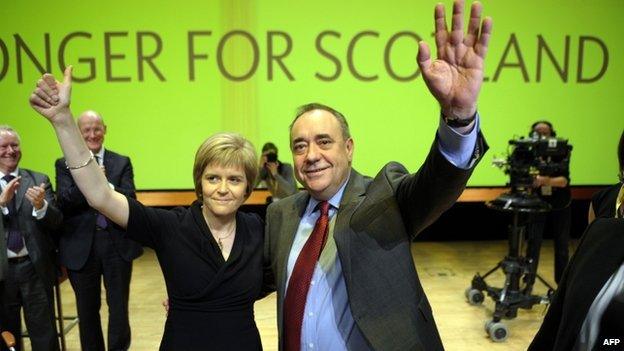Alex Salmond says SNP coalition at Westminster cannot be 'ruled out'
- Published
Alex Salmond says he has not ruled out the SNP joining a coalition at Westminster after the 2015 general election
Former SNP leader Alex Salmond has said it would be "foolish" for his party to rule out entering into a coalition at Westminster.
During a BBC interview he made it clear it was "out of the question" that a deal could be done with the Conservative Party.
But he said there were "other options" that should be considered.
Mr Salmond said he would decide soon whether to stand as a candidate at next May's General Election.
The SNP currently has six MPs, but the party's recent poll ratings suggest it could be on track to greatly increase that number.
In the event of none of the main Westminster parties - Conservative, Labour and Liberal Democrats - winning an overall majority, there is the possibility the SNP could play a power-sharing role.

ANALYSIS
By Brian Taylor, BBC Scotland political editor
"Another factor driving the sunny side at the Perth conference is the state of politics in Scotland and opinion polling in the run-up to May's UK general election.
"Delegates survey the Scottish Labour Party - and those polls. They conclude that the SNP has a good chance of picking up seats in May - and possibly even holding sway in post election negotiations.
"Not a coalition, not in any circumstances a deal with the Tories. But just, perhaps, maybe a confidence and supply or issue by issue agreement, extracting concessions for Scotland.
"Incidentally, Mr Salmond told me that is the one factor which might prompt him to seek to return to Westminster - against his personal disinclination.
"A third factor is that the SNP remains a movement as well as a party. The remarkable discipline they have shown at Holyrood seldom needs to be imposed. It is innate. They know they have a broader objective, a longer term aim.
"Fourthly, today's SNP is a different being from the organisation which entered a period of introspection and division after the referendum in 1979 which thwarted hopes of devolution at that time."

Mr Salmond told BBC Scotland's political editor, Brian Taylor, that he thought a "coalition with a Westminster party is unlikely".
The outgoing first minister was answering questions submitted by readers of the BBC news website.
He went on to say: "I agree absolutely with what Nicola [Sturgeon] has said on the matter that any coalition succour or support for the Conservative Party is out of the question - why, because of their attitude towards Scotland; because of their track record; because you couldn't trust them further than you could throw them.
"All of these things rule out a deal for the Conservative Party."
Mr Salmond added: "There are other options, of course, and it would be foolish to rule any of these others out because the main requirement of being the third largest party - your questioner alluded to - will be to advance the Scottish cause and in particular to hold Westminster's feet to the fire in terms of delivering the 'vow', the 'pledges' that were made to Scotland which proved so decisive in the final days of the referendum campaign."
'I love Scotland'
When he was asked whether he would return as an MP he said he had "no particular wish" to go back to Westminister.
However, he added that he was considering it for two reasons.
Mr Salmond said: "One thing is I love my constituency, I love the north east of Scotland - I love Scotland obviously - but the folk in the north east are just great.
"Secondly, there are particular circumstances, which maybe are emerging, where the cause of Scotland is going to be in the balance - where Scotland could win out of the ashes of the referendum campaign.
"Scotland can emerge victorious with substantial gains. That is what I am thinking about."

Ms Sturgeon formally took over as leader from Alex Salmond at the SNP conference on Thursday
Mr Salmond was speaking as the second day of the SNP's annual conference got under way in Perth.
He was formally replaced as SNP leader by Ms Sturgeon on Saturday morning. Ms Sturgeon will be voted in as Scottish first minister next week.
In his BBC interview, Mr Salmond spoke about the oil industry in Scotland saying that he was "surprised" that "so much information had been gained" about new oil discoveries in the weeks since the referendum.
He added he thought there would be "substantial quantities" of oil and gas revenue in the waters off Scotland for the "next half century and much more".
Scotland's first minister said he accepted that businesses who had been against independence had an "absolute equal right to speak out".
However, he questioned why companies who had talks in the Rose Garden of Downing Street with the prime minister "decide all of a sudden to have a corporate position against Scottish independence".